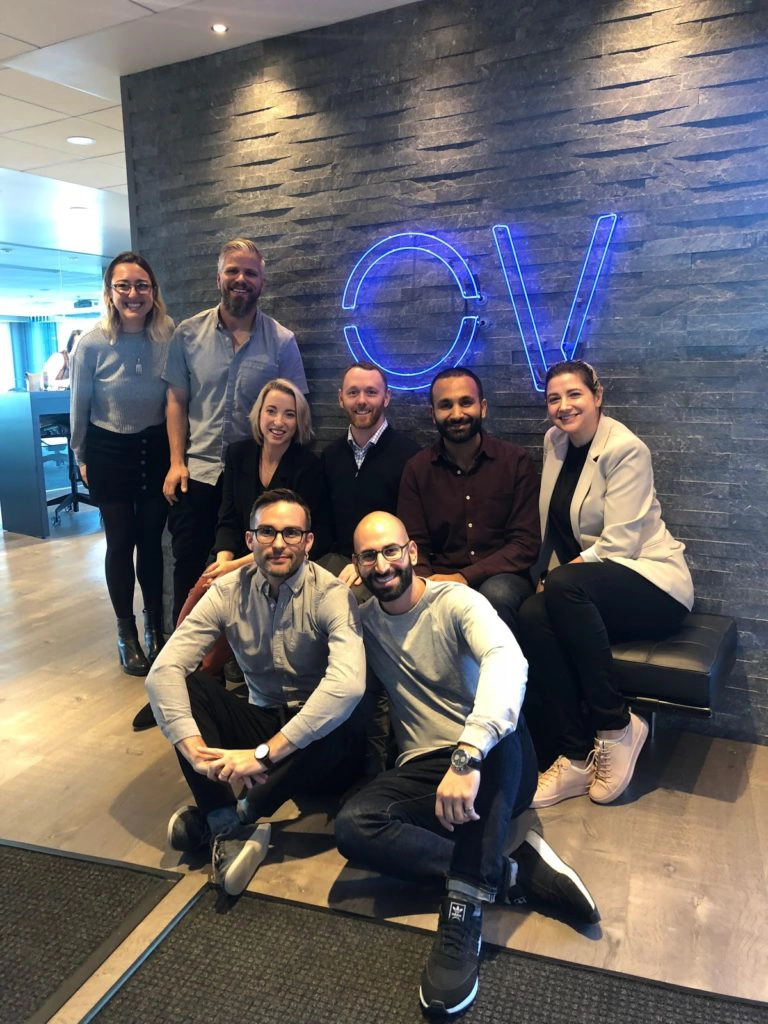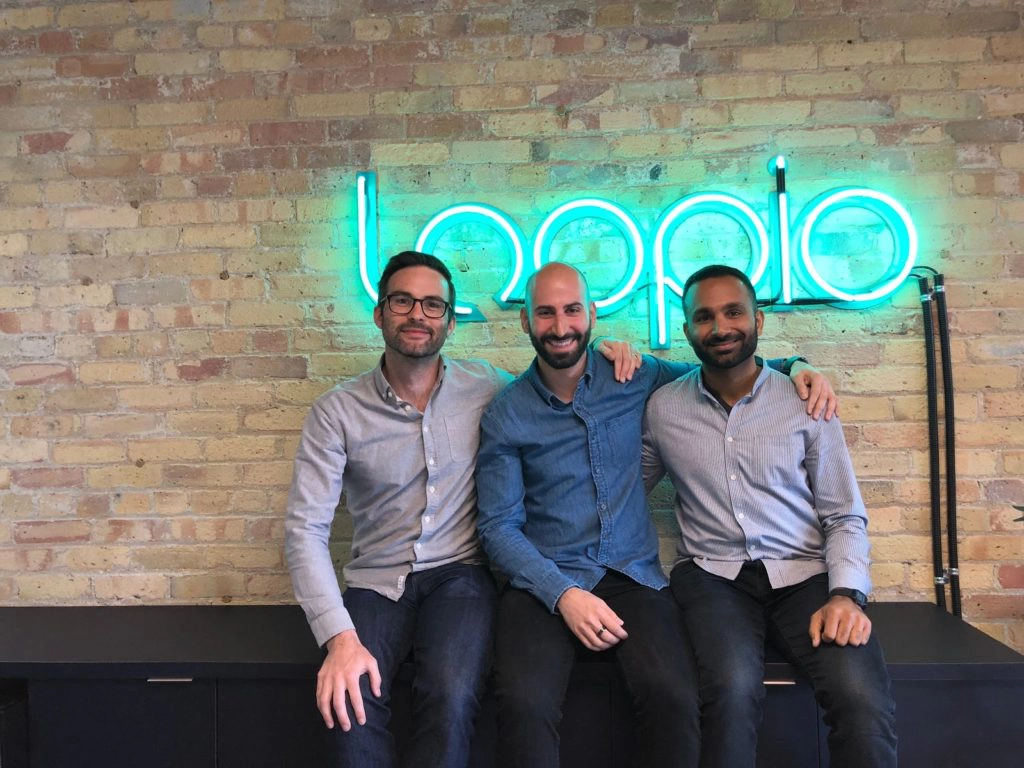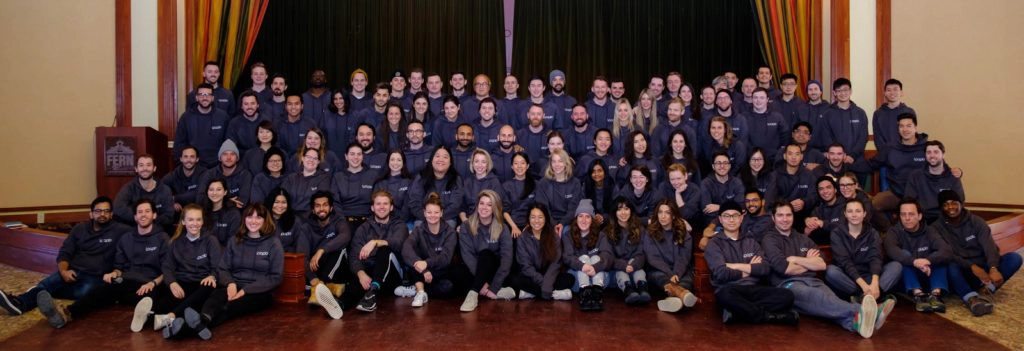From Zero to Loopio: Part IV
Almost four years ago, when we last sat down with the founders of Loopio, CEO Zak Hemraj, CTO Matt York, and CRO Jafar Owainati, the company was made up of five people with just about 50 customers, and run out of a hallway-sized office.
The present looks…a little different.
Loopio is now a venture-backed company with over 100 employees and over 600 customers, and the company has received several accolades including being named a Top Employer in Canada by the Globe and Mail, one of Deloitte Canada’s Companies to Watch List, and one one of LinkedIn’s Top Startups Canada. For a startup, this kind of aggressive growth can come with a pretty rocky path, but Zak, Matt, and Jafar have stayed laser-focused on people and culture and maintained a steady path forward. I sat down with the founders to reflect on the highs and lows of scaling a company so quickly, what that evolution has looked like, and their hopes for Loopio’s future.
The last time you were interviewed, you discussed how you had chosen not to pursue funding. How did you move from the perspective of not wanting to raise funding in 2015 to deciding to move forward with it?
Zak: We never fully rejected the idea; we had just chosen not to pursue it at the time. Even two years prior to closing our Series A round of funding, we were having conversations with investors and potential partners. We even had a spreadsheet which we called our “VCRM” (Venture Capital Relationship Management), and I think we had tracked about 50 potential different partners in there before the raise. We were clear with investors that we weren’t looking to raise any capital at that time; however, we still recognized the value of building relationships with them.
When it came down to deciding to pursue funding, we created a list of five to 10 questions where we asked ourselves what we wanted for the future of Loopio, for ourselves, what we felt the market opportunity was, and what we felt the risks were. We each went our away, answered them independently, and then came together over breakfast to discuss our answers.
Jafar: We looked at the risks on both sides– what the risks of NOT taking investment were, as well as what the risks were from raising. It was a big breakfast in Loopio history. Not only did we determine that we were aligned in pursuing funding, but also, Matt got a call that his wife was about to have their baby!
Matt: Right! I missed a call from my wife saying we were going to the hospital. We had a baby the same day we decided to raise a round of funding.
Zak: The birth of many things…
Jafar: Cue the dad jokes.
(All laugh)
Zak: I think the other thing is, the timing really felt right. We had become a Series A company from a metrics and operations perspective without ever raising any seed capital in the first place, and so from a financial perspective, company size perspective, and based on our market awareness and penetration, it all just felt right. We had a solid foundation to build on. We had a lot of confidence going into this decision.
Jafar: It’s true. After we raised Series A, in an interview with Crunchbase, our OpenView Partner, Ricky Pelletier, made a point of saying we already operated like a Series A or even a Series B company. That was a huge testament to what we had accomplished at that point.

Pictured from left to right in the back: Ariel Winton and Ricky Pelletier of OpenView, Alexis MacDonald, Aaron Booth, Zak Hemraj, and Melina Stathopoupos of Loopio. From left to right in the front: Matt York and Jafar Owainati of Loopio.
In Zero to Loopio I and II the importance of continual learning is a theme. In that spirit, what has been your most significant learning since starting Loopio?
Jafar: For me, it all comes down to people. Deciding to build an investor partnership introduced us to a lot of new dynamics. Having a formalized Board of Directors and the level and pace of bringing on the amount of talent we did in one year (we basically grew from 40 to over 100 people in 12 months) brought an intense need to be thoughtful about culture. We had lots of conversations and read a lot about how to maintain a strong culture when experiencing people growth at that velocity.
Matt: A big learning was finding leaders and investing in them, really making sure we’re bringing in the right leaders (people managers) and providing them with the tools and training they need to continue developing. We’ve learned a lot about continuing to work as a leadership group, and I think we’ve gotten a lot better.
Zak: For me, there’s been a lot of lessons in communication. Communication is everything. At the end of the day, businesses are made up of large amounts of information transfer. In our roles, we’re constantly jumping from different altitudes, so clarity and transparency in communication are critical – always providing context when you share information and thinking about the medium in which you share information. The medium is often just as important as the message itself. And I’m still learning every day about driving alignment across 100+ people.
How has the dynamic between the three of you evolved as the company has grown?
Matt: We definitely spend less time together. We’re all on separate floors now, but we’re certainly getting our steps in!
(All laugh)
Zak: In a scaling company, there’s a huge gravitational pull that causes founders to drift apart. So we make an effort to fight that, to stay aligned, to stay friends, and to stay respectful. We work at it every week through candid conversations and casual hangouts. We try to be role models wherever we can. How we come to decisions, how we treat each other, and how we collaborate are a reflection of behaviors we value and behaviors we don’t tolerate.
Matt: We’ve maintained the ability to debate and respect each other’s differing opinions. We all have things we own and have more expertise around, and we respect that about each other. You’ve gotta know when to let go.

Loopio’s co-founders from left to right: CTO Matt York, CRO Jafar Owainati, CEO Zak Hemraj.
Not to brag or anything, but we’ve been listed as a top startup in Canada by Linkedin, named one of Deloitte Canada’s Companies to Watch, and we’ve been recognized as a top employer by the Globe and Mail. What does this recognition mean to you?
Matt: It’s been a massive company effort, and the three of us are very proud, but we can’t take all of the credit.
Jafar: When I think about these awards and our external validation, what I find interesting are the different aspects they each represent. One of them is about employee engagement, another is about employee health and wellbeing in the workplace, and another is purely around the financial success and growth of the business. It’s a really cool recognition of very different, holistic elements of the business.
Zak: That recognition provides a lot of validation that we’re on the right path to building a great company, a great brand, a company that people want to work for and be a part of. It’s not the summit, though. It marks milestones along the path, but the nature of building a scaling company is that you don’t ever feel like you’re done. There’s still the next mountain to climb. But those accomplishments are definitely worth celebrating! I think high-growth companies don’t take enough time to reflect and celebrate.
As the company continues to grow at an accelerated rate, where do you think we need to continue to stay laser focused?
Jafar: We absolutely need to stay focused on empowering the people within these walls to be the best they can be in their job– performance alignment, coaching, making sure the different leaders and managers can provide the right mentorship for their teams. And, as we grow as a company, we need to think about some of the other areas where we can empower our customers further and doing it thoughtfully.
What should we be willing to let go?
Matt: I think we need to avoid becoming complacent and slower moving because of our growth. EPD has grown by four times in the last year. With more people, it’s natural to slow down, so it’s important to continue removing obstacles that get in the way of communicating, and making sure we’re aligned on what we’re doing.
Jafar: It’s not necessarily about what specifically we should be letting go of, but rather being open to letting go of things in general– making sure we’re retooling and evolving, and not feeling like we need to hold onto tradition for tradition’s sake. Otherwise, you’ll get stuck and get complacent.
Zak: We have to be willing to let go of all systems, processes, and ideas. That is a growth mindset. A company that is growing at our scale and pace is constantly reinventing itself, and what the company does, looks like, and feels like changes as a result. People are also constantly reinventing themselves. Rapid personal growth for employees has a symbiotic relationship with rapid company growth — they feed off of each other. If people aren’t willing to grow and reinvent themselves, then the company can’t, and vice versa.

Loopers at Loopio’s 2019 company retreat.
We put such an emphasis on our people and internal culture as our true differentiator. What are the core characteristics that define a “Looper” to you?
Matt: Those characteristics are our values: Grit, Mastery, Candor, Curiosity, and Support. They’re embodied in people who are thoughtful but also ambitious and want to move fast. Those two things sound like they’re in contrast, but that person knows when to work really hard at something and also knows when to take smart shortcuts. That is what the most successful Loopers understand.
Growth always brings about change. How has our culture evolved over time?
Zak: I think it’s important to acknowledge that it has evolved and that that’s a good thing. A lot of times, fast-growing companies get caught up in the narrative of protecting culture, but protecting things sometimes works against doing the right thing. Evolution is really important, and change can be a good thing so long as you do it thoughtfully. We’ve become a lot more diverse as a workforce over time, and that has driven new perspectives, energizing debates, and ultimately, better results.
Here’s a statement Zak made in 2015 in From Zero to Loopio: Part III about where you wanted Loopio to be in a year:
“From a product standpoint, the goal is for Loopio to be the go-to solution on the market for Proposal Management and RFI software in North America. So when a company has a need in this area, they are pointed to Loopio. Internally, it will be that we have defined an environment that people in Toronto want to be a part of. The goal is that people will be knocking on our door with the feeling of ‘I want to be a part of the growth and success of this software company.’”
Do you feel like you have successfully met this goal?
Zak: We have become a leader in our category, which is an amazing feeling. We have been labelled and validated that way a number of times. Will we ever be number one? Again, if you go back to the growth mindset, you should never feel like you’re the number one in anything. You should always be chasing more. As far as people knocking on our door, we’re now at a place where we get over 1,000 job applications a month! Do we want to be an even better employer? Absolutely! But yes, we’ve turned ourselves into a top employer in this city and this country. The fact that we said that just over three years ago is incredible to hear. We’ve made huge strides.
Where do you hope Loopio will be as a company in the next five years?
Jafar: I think the goals are still aligned to what we said in 2015. To me, those kinds of objectives are aspirational. It’s not something you can simply achieve and stop. The target continues to move the second you stop working at it, you’re no longer the number one company. The same goes for culture. As an employer, if you don’t continue to pay attention to your culture, you can go from being an amazing employer to having a toxic environment. If I think in the next three to five years, I see us expanding and potentially going global. I can see us being a multi-product company and expanding the offerings that we provide to the market in a way that’s complementary to what we’re doing today.
Matt: With the critical knowledge that the Loopio Platform holds, there are so many tangential opportunities for new products, integrations, and ideas. It’s a super exciting stage of the Loopio journey.
Zak: Our goal right now is to build a world-class company. That’s hard to quantify, but it involves everything from the product to the brand to the culture we’re creating. We want Loopio to be the backbone and highlight of people’s careers. We want Loopio to add so much value to our customers that they can’t imagine a world without it. We’ve laid a strong foundation, and now it’s time to scale to new heights and to continue living and breathing what we stand for.
Stay tuned!
That’s a wrap for this installment of Zero to Loopio. But fear not! There’s much more to come. We’ll be back with Zak, Matt, and Jafar sometime soon with Zero to Loopio Part V, the next exciting chapter in Loopio’s ongoing saga.


